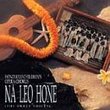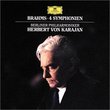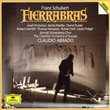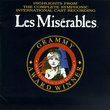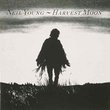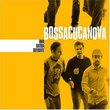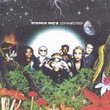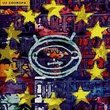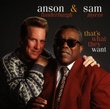| All Artists: Bernd Weikl, Carl Orff, James Levine, Chicago Symphony Orchestra, June Anderson, Philip Creech Title: Orff: Carmina Burana Members Wishing: 0 Total Copies: 0 Label: Deutsche Grammophon Release Date: 10/25/1990 Genre: Classical Style: Opera & Classical Vocal Number of Discs: 1 SwapaCD Credits: 1 UPC: 028941513625 |
Search - Bernd Weikl, Carl Orff, James Levine :: Orff: Carmina Burana
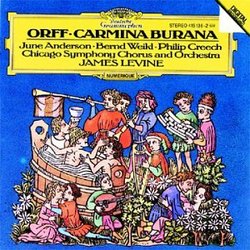 | Bernd Weikl, Carl Orff, James Levine Orff: Carmina Burana Genre: Classical
|
Larger Image |
CD DetailsSimilar CDsSimilarly Requested CDs
|
CD ReviewsThe Best Carmina Burana W. M. Robbins | The Beautiful Blue Ridge | 09/29/2002 (5 out of 5 stars) "I had been looking for a really good recording of the Carmina Burana to replace the one that I had, which was Pavel Urbanek and the Prague Festival Orchestra and Chorus, and this one is far better than I had hoped to find. Under the direction of James Levine, the Chicago Symphony Orchestra, the Chicago Symphony Chorus and the Glen Ellyn Children's Chorus turn in superlative performances. In addition the wonderful vocal talents of June Anderson, Phillip Creech and Bernd Weikl surpass all others whom I have heard perform this work. Miss Anderson's soprano in particular is a delight to listen to. The booklet contains translations of all of the songs, which is a tremendous help to those of us whose knowledge of Latin is not complete. I was interested to find that parts of the translations were different from others that I am familiar with. The digital recording of this performance is fantastic, with not a note over-engineered and no need to adjust the volume as the intensity of the music fluctuates. A great addition to any classical CD collection." Levine is divine Andrew Mayzak | Seattle, WA USA | 02/22/2002 (5 out of 5 stars) "I have the older Deutsche Grammophon recording with the Berlin City Opera Choir and Orchestra under the baton of Eugen Jochum and to be honest, I thought that recording was the best simply because it is commonly regarded as the landmark performance of Carmina Burana (and it is authorized by Orff himself). But Levine's Carmina Burana puts up a good fight and is a better technical performance. The choir and orchestra are not nearly as Germanic and gruff in this recording as they are in Jochum's and, as a result, sound undeniably modern and American. This works to their advantage, however. Jochum's recording, thrilling as it is, sounds throaty and shouted at times, the orchestra frequently dragging the choir behind it's rushing tempos or vice versa. Levine restrains the orchestra and the singers, putting both in their respective places. His tempos are slower than most, but still are brisk enough to give the entire work a drive second to none. The Chicago Symphony and Chorus follow the legatos and staccatos exactly as they are written, providing great contrast between slower and faster sections. Both the choral and instrumental elements are robust enough at times to put any German choir to shame, but also have a gentle softness that was absent in Jochum's recording. The result is a well balanced performance and the annunciation of the text comes through cleanly, especially on the first and last movements. The soloists are equally impressive, with Weikl's expressiveness cutting through the orchestra to provide a wonderful setting of the text. His Ego sum abbas is suitably arrogant and drunken at the same time... definitely not to be missed.Philip Creech sings the Roasted Swan Song in a high, strained tenor, the way Orff intended. The song isn't supposed to be pretty and Creech obliges us here. It's a great alternative from any of the tenors who sing it in falsetto.June Anderson, always a favorite at the Met, is at her usual best. In Trutina is dynamically varied while Dulcissime is clean cut. Anderson takes the lead completely in each, never waiting for the orchestra to come in first.This recording is a hidden gem and I'm surprised more people haven't bought it. Althought the contrasts between loud and soft may be more evident in Jochum's recording, Levine has created an almost techincally perfect performance with clear text and great differences in tempos. I would recommend this recording over Jochum's to anyone, especially students who are trying to learn the work." This is THE recording of Carmina Burana. A Must Get! Thomas Baugh (n9442571@cc.wwu.edu) | Bellingham, WA USA | 03/12/1999 (5 out of 5 stars) "Never before have I heard a Choral work of this magnitude and power. Orff's music is brought to life in this fantastic recording by the Chicago Symphony and Chorus. This is the only choral CD that I own that I can listen to for eternity and never get tired of it. The tone and clarity of the chorus is amazing, and the balance with the orchestra is perfect. Teachers - if you are looking for a tool for diction, tone, musicality, men's voices, and ensemble, you must get this CD. June Anderson will enthrall you with the last two soprano movements (In Trutina, Dulcissime). Bernd Weikl gives us bass/baritones something to idolize and strive to sound like. Many thanks go to James Levine for his extraordinary interpretations.If there is only one CD that you can get right now, make it this one. The power and precision of this version of Carmina Burana will floor you and anyone else who listens to it. It is one that should be in every musician's library."
|

 Track Listings (25) - Disc #1
Track Listings (25) - Disc #1